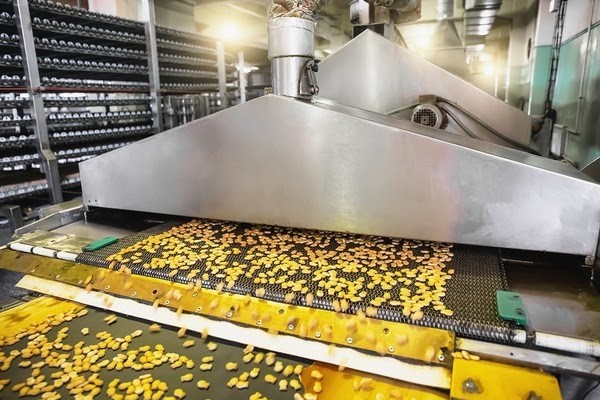
For companies that understand the strategic value of technology as a competitive asset, Enterprise Resource Planning (ERP) software is the foundational tool that drives efficiency, scalability, agility and business resiliency.
2020 has been a year of unprecedented change as the COVID-19 crisis has resulted in disruption across virtually every industry across the globe. Business leaders have been compelled to cope with an abrupt end to business-as-usual. The food and beverage industry has been especially challenged, as the closure of restaurants and institutional dining facilities has resulted in dramatic fluctuations in volume. At the same time, demand has surged for nonperishable groceries and staple foods as consumers flood stores to stock up on the basics.
Fluctuating demand has certainly not been the only challenge for food and beverage companies, though. Food safety and sanitation have been in the spotlight as the world has sought to mitigate the spread of a potentially deadly virus about which we know very little.
Managing an on-premise workforce and production facilities has been more demanding in this age of social distancing. Finally, supply chain disruptions, as well as concerns about potential disruptions, have created a new set of concerns around efficient and accurate production planning.
In the face of all this turmoil, business leaders have come to appreciate the value of agility and resiliency. They have seen a clear need to streamline business processes and accelerate the flow of data through their businesses so that managers can have a real-time view of what is happening across the organization. Perhaps most importantly, leaders need robust planning and modeling capabilities that enable scenario planning and on-the-fly “what if” analysis.
Technology as a Strategic Asset
Over the past two decades, technology has become a strategic differentiator. Software technology, in particular, functions as a force multiplier, rendering a skilled workforce more effective and efficient. Planning and operations software has helped companies streamline processes, reduce costs and increase service levels. CRM has enabled companies to better understand their customers, increase satisfaction and win new business. Business intelligence and analytics solutions provide up-to-the-minute insights that drive strategic decisions.
For food and beverage companies that have understood the strategic relevance of technology as a competitive advantage, ERP has become the foundational asset that sits at the center of the organization. When business leaders are able to make decisions based on a single source of truth and rely on one integrated system to run their business, they can increase efficiencies, lower costs, automate processes, improve customer satisfaction and respond rapidly to external events.

When a Crisis Happens…
As the disruption wrought by the COVID-19 pandemic started to become clear earlier this year, companies that had already invested in technology were at a natural advantage. Businesses that had already established remote capabilities and deployed collaboration platforms were able to shift a portion of their workforce to home offices without much difficulty.
Companies that had previously invested in automation and integration began to reap additional benefits from those technology assets. Vendor and customer portals enabled self-service and provided an additional layer of continuity through the disruption brought on by COVID-19.
Businesses that were already equipped to sell their product online saw a significant spike in sales through that channel, even as sales through other avenues dropped precipitously.
For companies that already view technology as a strategic asset, the COVID-19 crisis has validated this perspective. For others, it has been a wake-up call, reinforcing the need to build organizational agility and resiliency so that their business can recover rapidly from the current crisis. Just as importantly, it underscores the importance of being prepared for whatever may lie ahead.
In many respects, small and midsize businesses have an advantage over their larger counterparts, as they are often able to pivot quickly and launch innovations more rapidly. At the same time, however, SMEs tend to be more resource-constrained and have faced higher overall risks as a result of the COVID-19 pandemic. In any case, agility and resiliency have become a priority for businesses of all sizes.
In a recent survey of food and beverage company executives, 47 percent of respondents said they did not have an existing contingency or continuity plan for emergencies like the COVID-19 pandemic. Sixty-six percent of those without a plan said they intend to develop one for the future. In times of crisis, agility can be the difference between the life or death of your business.
Investing in Agility and Resiliency
Following global lockdowns, many businesses deferred capital expenditures to preserve cash. Although this is a natural reaction during a time of uncertainty, it doesn’t work well as a long-term strategy. Experts from McKinsey and Company point out that resilient companies tend to be faster to respond than their less-resilient counterparts. This is not only the case during the onset of a crisis; resilient companies tend to be earlier when it comes to investing in recovery.
For food and beverage companies, ERP software provides comprehensive management and visibility across key functional areas such as finance, operations, quality and compliance, production, inventory and distribution. Achieving excellence across these departments requires a holistic view of the business, a technology platform designed to address specific industry requirements and a team of experts who can tailor that technology to fit your existing business processes and strategic objectives.
FoodBusiness ERP is purpose-built for the food and beverage industry. It is designed to help manufacturers streamline operational efficiency, manage growth and provide business leaders with the insight and control needed to take their businesses to the next level.
To truly become agile and resilient, business leaders need to rely on technology and software to do the heavy lifting. To learn more about how FoodBusiness ERP can help your company future-proof its operations, reach out to us. We’d love to chat.

